Verifying your business in the European Union (EU)
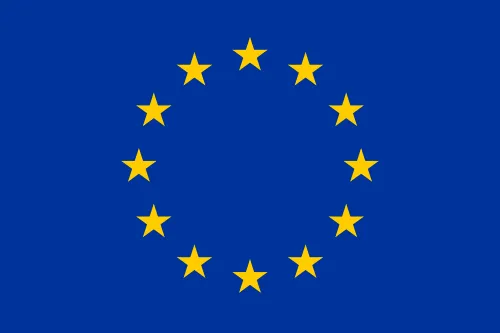
This article outlines the documents required for organizations registered in the European Union (EU) to complete business verification.
Verification, commonly referred to as KYC or "Know Your Customer," is a regulatory requirement for offering financial services to businesses and individuals. The process involves collecting, reviewing, and maintaining information about the entities and individuals using our services.
The verification process is divided into two primary components: Business Verification (Verifying the nature and ownership of the business) and People Verification.
Topics covered here, include:
- Verifying the nature of your business
- Verifying ownership
- Verifying individuals
- Additional requirements
- Document requirements
Verifying the nature of your business
The Nature of business must be verified to ensure it aligns with regulatory requirements, accurately reflects its stated operations, and complies with industry and legal standards. Evidence of business activities may include:
- Website
If your company does not have a working website, please provide one of the below:
- Contracts
- Business agreements
Or, a combination of the following:
- Company profile or presentation / company brochures or marketing material / detailed business plan
- Invoice (document must be issued within 1 year, and must clearly showcase business operations)
Prohibited Business Categories
If your company’s industry falls under any one of the listed categories, the application may be either rejected, or additional documents may be requested.
Prohibited and Restricted Business Categories
Verifying Ownership
Nium prioritizes obtaining documents from reliable and independent sources, such as public registries, to streamline and simplify the onboarding process. Customers are only asked to submit documents themselves when these sources do not provide the necessary information, ensuring efficiency while upholding regulatory compliance. Required documents may include:
- Business registration document.
- Register list of Directors and Register list of shareholders (can be same document as number 1 if it holds the same information).
See requirements for documents here
For Multi-layer ownership structure companies, see section Multi-layer ownership structure
Verifying Individuals
For all company types, the individuals below must be verified:
| Entity Type | Applicant | All Directors | UBO / Controlling Person | Additional authorized signatories |
| All entity types | ✓ | ✓ |
✓ *Under some conditions, all shareholders, holding 10% and more of ownership shares may have to be verified |
✓ |
See requirements for documents here
What is a UBO?
Ultimate Beneficial Owner (UBO) is considered to be an individual, holding more than 25% of ownership shares. Note that an individual holding 25% or less than ownership shares is not considered to be a UBO.
What to do when there is no UBO?
If no single individual holds more than 25% of ownership shares, the most Senior Director would be considered as the Controlling Person.
If the most Senior Director cannot be identified, written confirmation may be requested from the customer.
How to identify company Directors?
Directors will be listed in company registration documents. If the Director is not an individual, but an entity, customer may have to provide the following document:
- Notarized List of Directors. See requirements for this document here
Additional Requirements
- Letter of Authorization / Power of Attorney
- Multi-layer ownership structure
- Projected activity
- Source of Funds / Source of Wealth
Letter of Authorization / Power of Attorney
If the onboarding application is being prepared or submitted by individuals who are not Directors, a Letter of Authorization is required. This form authorizes these individuals to act on behalf of the company. Below are the requirements based on the company type:
Nium has issued a template for this document.
Download Letter of Authorization here
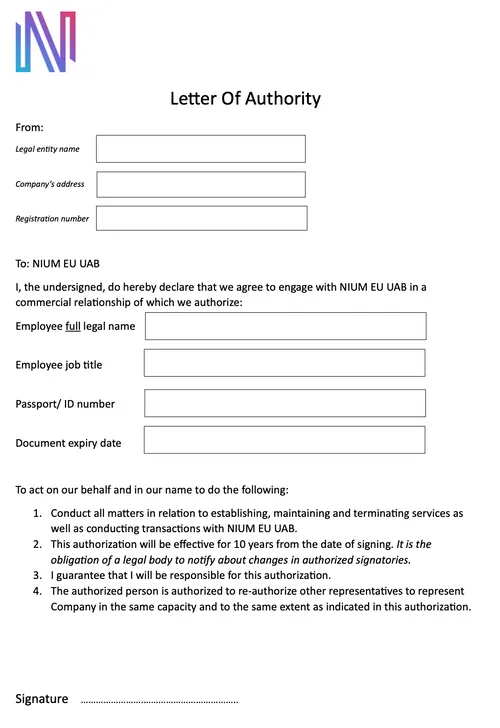
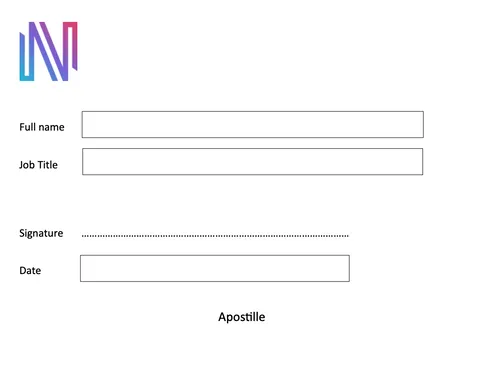
| Entity Type | When Required | Who Signs the Document | Document Validity |
| All entity types | For any individual who is not a Director | Company Director |
|
*In case a Letter of Authorization (LOA) is needed, it must be signed by a Director who is officially recognized as an authorized representative of the entity being onboarded into Nium per official registers.
For large enterprises with multiple entities, the LOA must be signed by a Director - as mentioned above - of the specific entity establishing a relationship with Nium.
Multi-layer ownership structure
A multi-layer ownership structure exists when a company is owned indirectly through one or more intermediate entities, rather than being directly owned by individuals or a single organization.
To determine if your company has a multi-layer ownership structure, please refer to the below questions:
- Is your company owned by another entity (e.g., a company, trust, or partnership) rather than directly by individuals?
If yes, there is at least one layer of ownership. - Does that owning entity itself have owners who are other entities?
If yes, this adds another layer to the structure. - Can the ultimate beneficial owners (the individuals who control or benefit from the company) only be identified by tracing ownership through multiple entities?
If yes, your company has a multi-layer ownership structure.
In simpler terms, if you must navigate through several entities to find the ultimate owners or decision-makers, your company likely has a multi-layer ownership structure.
Providing documents for multi-layer ownership structure
Nium prioritizes obtaining documents from reliable and independent sources, such as public registries, to streamline and simplify the onboarding process. Customers are only asked to submit documents themselves when these sources do not provide the necessary information, ensuring efficiency while upholding regulatory compliance. Required documents may include:
- Business registration document.
- Register list of Directors and Register list of shareholders (can be same document as number 1 if it holds the same information).
See requirements for documents here
Projected activity
All EU onboarding cases require an additional questionnaire:
- Top Pay in and Pay out countries
- Top senders and beneficiaries
- Expected monthly volumes for Pay in and Pay out
- Average transaction value
- Annual turnover specified (if annual turnover is more than EUR 2,000,001)
- Amount of Monthly Transactions for Pay in and Pay out
Source of Funds / Source of Wealth
Nium may request a Source of Funds or Source of Wealth document under certain circumstances. This is not a requirement for all customers and is only requested in specific cases. Factors such as the type of business, the nature or industry of business activities, and any elements affecting Nium’s risk assessment may lead to an Enhanced Due Diligence Questionnaire being issued. Please note, this is not applicable to all onboarding cases and is determined on a case-by-case basis.
Source of Funds - the origin of funds that an individual or company uses to finance its operations.
Source of Wealth – origin and means of wealth, reflecting the overall accumulated net worth of entity/individual, used to establish and operate a company. A written explanation, accompanied by supporting documentation, must be collected to confirm the legitimacy of the customer’s wealth for conducting business.
Examples of supporting documentation for Source of Wealth / Source of Funds:
- Personal or joint savings, collected in form of bank statements
- Employment income, including salaries, bonuses, and pension
- Loan agreements
- Contract agreements
- Sale of assets (real estate, shares)
- Inheritances, including family wealth transfer
- Compensation from legal settlements
- Profits from legitimate business activities or investments
- Ownership of businesses or investments, including returns
- Other documents, related to customer’s funds or wealth
Document Requirements
Identity Verification
Depending on the role individual holds, different requirements apply:
Applicant / Authorized signatory
- Biometric verification
Director
Nium will attempt to verify the Directors using reliable and independent sources. In cases where verification is incomplete, below information may be requested:
- Full legal name
- Personal identification number (if available)
- Full Date of Birth
- Nationality (If individual does not have nationality - document issue country)
- Country of residence
UBO / Controlling Person
Nium will attempt to verify the UBOs / Controlling Persons using reliable and independent sources. In cases where verification is incomplete, one of the options will be required:
Option 1:
- Biometric verification
- Tax ID number
Option 2:
- Notarized Proof of Identity document. Notarization must be done within 6 months, and the Notary must confirm that the document is a true copy
- Tax ID number
Mandatory information to provide (if not covered already):
- Identity document type
- Identity document number
- Identity document issuing country
- Identity document expiry date
Proof of Identity
- Passport
- National ID card (both sides)
- Residence Permit (both sides)
- Document should be with valid expiry date, good quality, colored copy, all four corners must be visible.
- Copy of a copy is not accepted
- Black & white documents are not accepted
- Driver’s licenses are not acceptable
- Passport must have a signature
Examples of identity documents
Passport
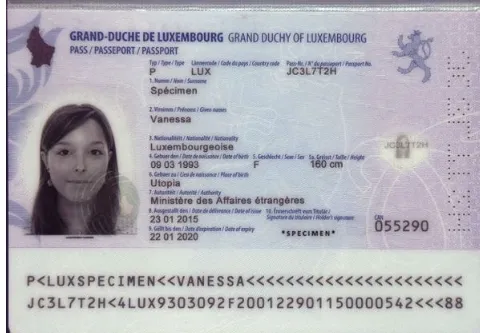
National ID card
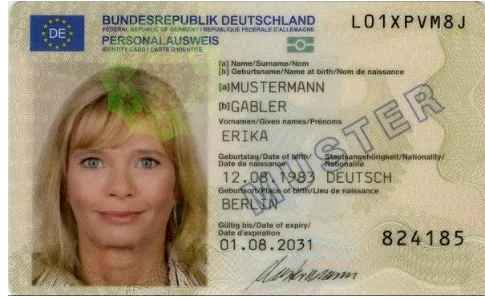
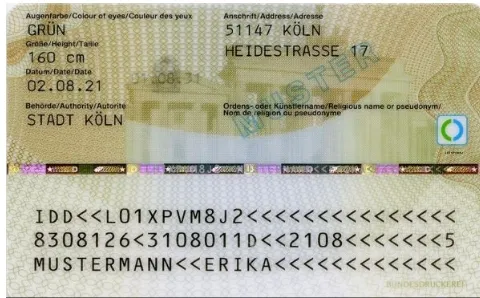
Residence Permit

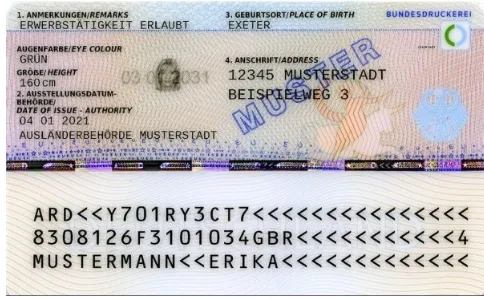
Biometric Verification
Biometric verification is any means by which a person can be uniquely identified by evaluating one or more distinguishing biological traits. Nium uses 3rd party services such as Onfido or Jumio to verify individuals by collecting their identity document and selfie.
How does Biometric verification work?
A unique identifying URL link is issued for each individual verification. Once the link is opened, the verification must be completed within 24 hours, and it must be done in a single and uninterrupted session. Important to note:
- Live Photo of ID: Customers are required to take a live photo of a government-issued ID (e.g., passport, national ID card) using the onboarding platform. The ID must be clear and show both the front and back (if applicable).
- Live Selfie: Individuals must take a live selfie to verify their identity. This is done in real-time using the camera on their device to match their face with the photo on their ID.
- Facial Recognition Check: The system compares the selfie with the ID photo using facial recognition technology to ensure the person presenting the ID is the same individual.
- Liveness Detection: verification platform will conduct a liveliness check to prove they are physically present and not using a photo or video.
- Lighting and Clarity: Clear lighting, no shadows, and a direct view of the face are essential for successful biometric verification. The face and ID should be unobstructed (no hats, glasses, etc.).
- Privacy and Security: All biometric data is encrypted and securely stored to protect the individual’s information, complying with data protection regulations.
- Quality of the camera: often times it’s best to use a mobile phone due to better camera quality in order to capture clear ID details.
Tax ID (VAT ID)
Why Tax ID is collected for UBOs?
NIUM is obligated to meet regulatory requirements in jurisdictions they are licensed in. Tax ID is a requirement made by Lithuania, UK and US regional governments.
When is Tax ID not required?
If a customer is unable to provide Tax ID for the UBOs, an exception can be made only for entities, which are classified as Active Non-Financial Entity (Passive NFE).
Nium has issued a template email, which must be signed by the customer.
Download a template email here
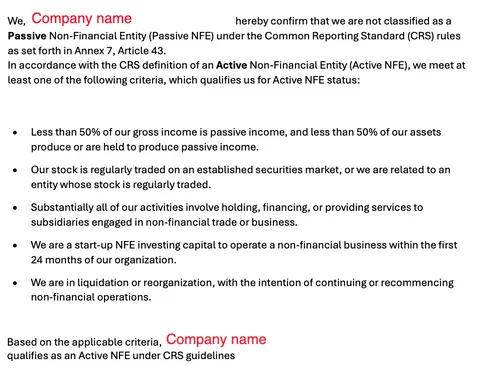
When is Tax ID not required for Companies?
If the Company is not eligible for Tax ID (for example, the company hasn’t achieved a certain annual turnover threshold), the Tax ID may not be required upon onboarding.
Ownership Document Requirements
- Business registration document should include:
- Business name
- Business registration number
- Issuing authority
- Registration date
- Company address
- Issuing country
- Shareholding documents should include:
- Business name
- Business registration number
- List of company Directors
- List of company Shareholders, and their holding percentages
- List of Directors should include:
- Business name
- Business registration number
- List of company Directors, including the most Senior Director
Under some conditions, documents may be required to meet the following requirements:
- Notarization within 6 months*
*Please see notes on notarization:
Option 1: If the documents are extracted from local registry database - Notary must confirm that the “Copy is true”.
Option 2: If the documents are issued by customer internally -Notary must confirm that the “Contents are true and correct”.
Why are apostilled documents required in Europe?
Apostilled documents are legally certified for international use, ensuring their authenticity and acceptance across different jurisdictions. NIUM obligation in Europe is to verify documents submitted by the customer with independent source. The source can be official registries or third party vendors NIUM uses. If information is not available via any other venue, NIUM will request ownership documents to be apostilled so it can be internationally recognized.